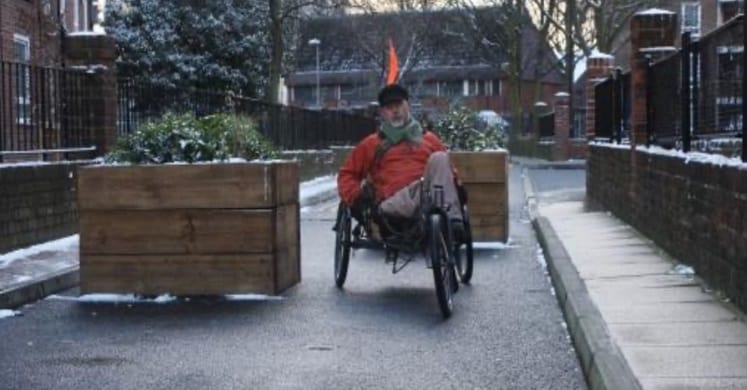“Give us safe space for access and we can get our freedom back!” say Disabled people

Wheels for Wellbeing, who advocate on behalf of Disabled people who wheel and cycle, have issued a statement asking the government and local authorities to prioritise the freedom of movement of Disabled and older people in post-lockdown Britain. They point out that lockdown is having a greater detrimental impact on Disabled people, who are more likely to have been self-isolating, had fewer opportunities to exercise, and experienced greater social isolation. Therefore safe and accessible walking/wheeling/cycling opportunities for Disabled people are more – not less – vital as we move into a ‘new normal’ after Covid-19.
With government funding, local authorities across the UK are introducing pro-‘active travel’ measures with the aim of limiting overcrowding on public transport and reducing reliance on private cars. Very quickly and mostly using temporary barriers/cones, etc., pavements are being widened; car access is being limited in certain neighbourhoods and car lanes are being turned into cycle lanes. The charity say that unless pop-up pavements and cycle lanes are accessible to all and unless Disabled car parking is retained, Disabled people will remain prisoners in their own homes because they won’t be able to physically distance and it won’t be safe for them to move around.
Wheels for Wellbeing Director Isabelle Clement says: “Disabled people want and need to walk, wheel and cycle to rebuild our fitness and so we can get back to our lives after weeks in lockdown. However, if pop-up cycle lanes and widened pavements are rushed and aren’t fully accessible, streets will become no-go areas for us, forcing many to lock ourselves away until a vaccine or treatment are found. So we call on government and local authorities to engage with Disability groups nationally and locally. We can help to get it right.”
Wheels for Wellbeing are also asking the government and local authorities to consider in particular the barriers to Disabled people’s wheel mobility: cycle lanes must suited to a diverse range of cycles and mobility scooters; subsidies are needed for non-standard cycles for Disabled people; government need to recognise cycles as mobility aids; a public education campaign should be run to raise awareness of everyone’s role in ensuring Disabled people are safe when out and about. “We strongly believe that when streets are safe for Disabled people to physically distance, they will be all the safer for everyone else too. Inclusive design isn’t a nice to have anymore, it’s a public health priority”! Clement added.
Notes to the Editor:
- Wheels for Wellbeing is led by Disabled people and fights for equal rights to enjoy the wellbeing benefits of wheeling & cycling.
- 19% of the population are over 65 and 21% of UK adults are Disabled. The NHS has advised 1.8 million people who are extremely vulnerable to COVID-19 infection (who have conditions including blood cancer, MS, or severe chest conditions) to practice ‘shielding’ and remain at home.
- Being isolated indoors for prolonged periods leads to a greatly increased risk of ill health, and greater care needs. The Chief Medical Officer recommends that every adult, including Disabled people, should aim for a minimum of 150 minutes per week of moderate intensity exercise to improve their mental and physical health. Even before lockdown Disabled people were 50% less likely to achieve this. For all citizens, restrictions on the ability to exercise and on social interaction may cause or worsen key medical conditions, leading to an increase in the incidence of disability and higher economic costs.
- We suggest new temporary cycle lanes should be called ‘micro-mobility lanes’, for use by anyone with a mobility scooter, electric cycle, scooter, or cycle who wishes to use the road surface but travel faster than pedestrians on the pavement.
- A ‘cycle Blue Badge’ scheme would allow those people who cycle but cannot dismount and/or walk their cycle (their cycle is their mobility aid) to access the pavement and to wheel considerately in pedestrianised areas when accessing buildings.
For more information about Wheels for Wellbeing’s position statement or to talk to someone about it, please email info@wheelsforwellbeing.org.uk or call Isabelle Clement on 07903450137.
